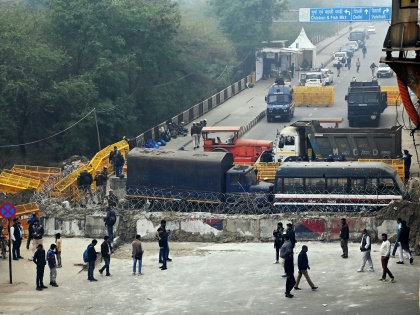Farmers’ Protest: Delhi’s Singhu, Tikri Borders To Be Partially Reopened – Details Inside
By Lokmat English Desk | Published: February 24, 2024 09:14 PM2024-02-24T21:14:50+5:302024-02-24T21:15:20+5:30
In a move aimed at easing commuter woes amid the ongoing farmers' protests near the borders of Delhi and ...

Farmers’ Protest: Delhi’s Singhu, Tikri Borders To Be Partially Reopened – Details Inside
In a move aimed at easing commuter woes amid the ongoing farmers' protests near the borders of Delhi and the National Capital Region (NCR), authorities have initiated the partial reopening of the Singhu and Tikri borders with Haryana. The reopening comes nearly two weeks after the borders were sealed in light of the farmers' 'Delhi Chalo' march, according to PTI.
According to a Delhi Police official, one lane of the service lane at the Singhu border and one lane at the Tikri border are being opened to facilitate the movement of vehicles. This decision brings relief to commuters traveling from Delhi to Haryana, who had been facing significant disruptions due to the protests.
The Singhu and Tikri borders were sealed on February 13 as farmers from Punjab began their 'Delhi Chalo' march to press their demands, which include a minimum support price (MSP) for crops and a farm loan waiver. Thousands of farmers have been camping on the Punjab-Haryana border near Ambala, approximately 200 kilometers from Delhi, after their march was halted by security forces.
In response to the ongoing protests, the Samyukta Kisan Morcha (SKM), an umbrella organization of farmers' groups, announced a series of protests, including a 'mahapanchayat' in Delhi on March 14. The SKM demanded the registration of a murder case against Haryana Chief Minister Manohar Lal Khattar and Home Minister Anil Vij following the death of a protester during the agitation. They also demanded a compensation of Rs 1 crore for the deceased.
BKU Leader Rakesh Tikait, addressing the media after a coordination committee meeting of the SKM, declared February 26 as a 'black day' to protest the non-implementation of their demands, particularly the law guaranteeing the MSP of crops. Tikait called for nationwide protests and demanded the registration of a murder case under Section 320 of the Indian Penal Code against the Haryana CM and Home Minister.
Furthermore, Tikait announced plans for a tractor march across the country on February 26, with tractors allowed to ply on one side of national highways to minimize disruption to commuters. Additionally, a 'mahapanchayat' is scheduled to be held in Delhi on March 14 to decide on the future course of action.
Open in app